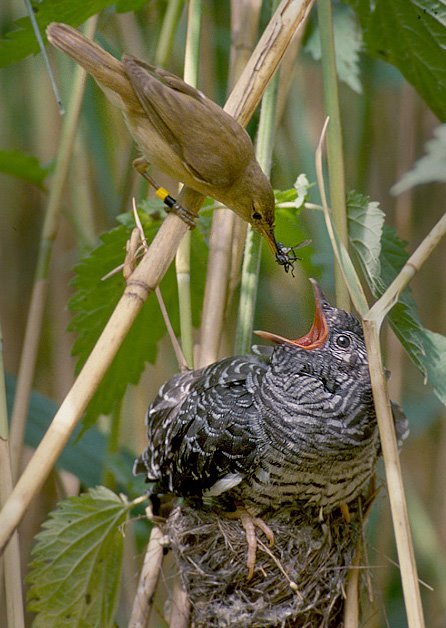
Brood parasites are birds such as cuckoos that lay their eggs in other birds’ nests. The unwitting foster parents nurture the intruder, often to their own genetic detriment. The cuckoo chick invariably hatches first, immediately ejecting all its stepsiblings from the nest. But why does the cuckoo chick always hatch first? The answer appears to be internal incubation.
Tim Birkhead led a team from the University of Sheffield as well as researchers across Europe in documenting the first known cases of internal incubation in birds. Normally, female birds follow a strict time schedule of egg laying. The female ovulates, followed within 15 minutes by fertilization. Six hours later, the embryo begins to develop, and over the next eighteen hours, the yolk is surrounded by the albumin (the white) and the egg shell. At this point, twenty-four hours after ovulation, the egg is complete and is laid.
Cuckoo eggs follow this same time schedule except for the laying. The completed egg sits in the female cuckoo’s oviduct for another 24 hours before being laid. This means that if a cuckoo egg and a songbird egg are laid the same day, the cuckoo egg is a full day ahead of the songbird in development.
The head start is even more pronounced if you account for the difference in temperature between internal and external incubation. After the first 24 hours, the songbird egg incubates in the nest at about 36 °C. In contrast, during that same time period, the cuckoo egg is incubating at an internal temperature of 40 °C. According to the researchers, for a bird embryo, 24 hours at 40 °C is like 31 hours at 36 °C.
Prior to this study, it was believed that birds had to immediately lay completed eggs. Being able to keep the eggs internally for an additional 24 hours gives cuckoos a great advantage of their hosts.
Photo: Reed Warbler feeding a Common Cuckoo chick in a nest.
No comments:
Post a Comment